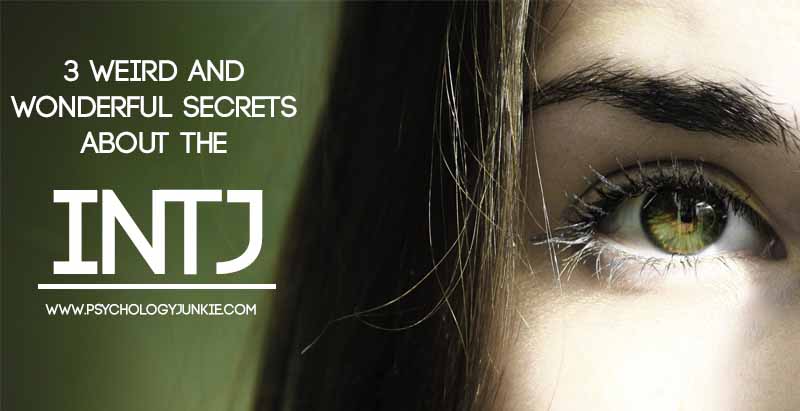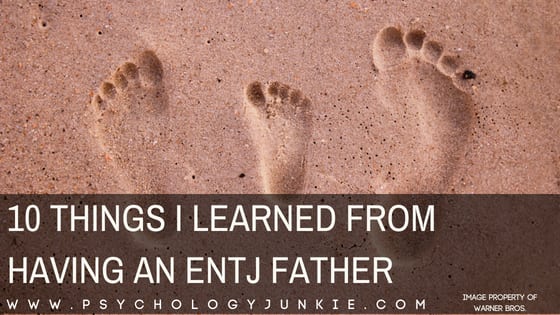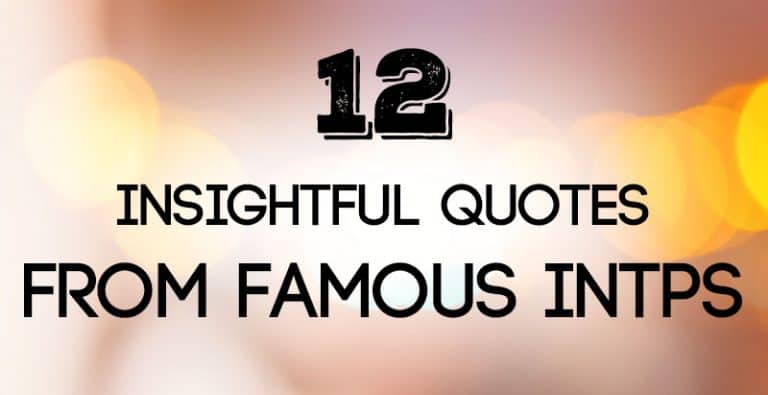3 Weird and Wonderful Secrets About the INTJ
Weird: “Of Strange or extraordinary character: Odd, Fantastic”
– Merriam-Webster Dictionary
Weirdness is a trait that is simultaneously repressed and admired by people all over the world. What was once considered “weird” is now considered trendy in many cases. What was once considered “cool” is now considered old-fashioned or boring. When it comes to personality type, there have been certain types that have been revered or “weird” depending on the culture and era.
But what makes INTJs extraordinary, strange, odd, or fantastic? What unique, yet possibly “weird” traits make them stand out? Let’s take a look!
Not sure what your personality type is? Take our new personality questionnaire here. Or you can take the official MBTI® here.
INTJs Are Strongly Rational Yet Completely Mysterious
INTJs strongly value objective logic. When it comes to decisions, they trust facts, data, and truth. That said, their dominant function isn’t about facts and concrete data. Introverted Intuition is extremely mysterious in its workings and often lies outside of concrete, tangible reality – at least to most observers. INTJs get epiphanies or “hunches” that seem to appear out of the blue, and initially, even they can’t pin down why they believe in them with such certainty.
Building Blocks of Personality Type says of Introverted Intuition, that it “May experience insights that are not connected to the tangible world in any way that makes sense to anyone else.” It is only with time and reflection that the “dots are connected” and INTJs realize how they got their startling visions and insights. The premonitions and impressions they receive can appear magical or confusing to onlookers. The accuracy of their insight is uncanny and even scary to some people.
For the INTJ who values empirical data and proof to such a strong degree, moving forward on an epiphany or insight seems counter to their pragmatic outward persona. It’s a paradox that makes them all the more mysterious and intriguing!
INTJs May Seem Cold on the Outside, But They Develop Astounding Empathy
There are a lot of “cold, robotic” stereotypes about INTJs in the type community, especially online. But what most people ignore is that INTJs actually have tertiary Introverted Feeling (Fi). While as children this function may not develop or show itself very often, as INTJs reach their 20’s and beyond they start to develop a stronger sense of individuality, a personal moral code, and empathy for others.
As introverted intuitives, INTJs are also skilled at seeing things from multiple perspectives and vantage points. According to Jungian analysts Gary and Margaret Hartzler, “The Seer (INJ) often sees ideas simultaneously from several perspectives. For example, if several people are involved in a discussion, the Seer in us is able to see the various points of view, virtually simultaneously.”
INTJs are actually quite adept at seeing things from the perspectives of individuals far different from themselves and, as a result, are much more empathetic than stereotypes would imply. INTJs may keep a lot of their feelings inside (after all, they value introverted feeling) but this doesn’t mean they don’t care. As INTJs get older and more mature you will see a strong sense of moral direction or individualistic values that influence their decisions. You may find them strongly empathetic and concerned with protecting underdogs or persecuted people or animals. Cold robots? Not if you read up on your cognitive functions!
INTJs Think in Symbols and Images
One of the defining traits of Introverted Intuition is a tendency to think in terms of symbolic imagery. According to typologist AJ Drenth, “They (INJs) think by way of images rather than words. Their intuitions often manifest in the form of symbols, images, dreams, or patterns. This is consistent with Jung’s characterization of the Ni type as a dreamer, artist, or seer.” This is often why INTJs will express themselves using a lot of metaphor and simile rather than concrete language. They blend rational, fact-based thinking with vivid imagery to make a powerful impression in their speech and writing.
“Anything described that is devoid of associated images or symbolism seems barren and without life. By recognizing the power of symbolism, the Seer is able to significantly restructure reality simply by choosing another perspective on the data.”
– Margaret and Gary Hartzler, Functions of Type: Activities for Developing the Eight Jungian Functions
“Why Don’t I Relate To This?”
The majority of people who get an INTJ result in an online test are actually ISTJs, ESTJs, or ISTPs. For this reason, when we really get into the deep theory of type and introverted intuition, a lot of people are scratching their heads and thinking “either this information is wrong or I’m not typed correctly.” So you have to ask yourself:
“When I take in information am I looking more at what’s tangible, concrete, verifiable and tried-and-true?”
“When I look at the world around me do I get strong impressions that relate to my past experience, memories, and facts I’ve accumulated in my life?”
This would mean you probably identify more with Si than Ni, and would, therefore, be an STJ.
OR, when you look at the world around you do you think of everything’s symbolic significance, deeper meaning, and relationship to the rest of the universe? Do you find yourself considering abstract ideas and possibilities that are unrelated to the object you’ve seen, yet may have been triggered in some way by that object? If so, then you have more of a leaning towards intuition and INTJ is more likely your accurate result.
All About INTJs
Have any thoughts to share?
Let us know in the comments!
Find out more about your personality type in our eBook, Discovering You: Unlocking the Power of Personality Type.
Other Articles You Might Enjoy:
10 Things You’ll Relate to if You’re an INTJ
10 Things You Should Never Say to an INTJ
10 Intuition Hacks for INTJs and INFJs











That’s cool about the imagery part. Growing up I never understood how people who are born blind, could ever imagine things… but if not all blind people are intjs, then they would be able to think differently. Hmm, INTJ.
Very accurate and true. So much so that I forwarded it to my wife, whom I believe to be an INFP, so she could get a glimpse of how I’m wired. And after 21 years, she’s slowly progressing through the external onion layers.
Well, I know some ISTP and they have a Si. Not everytime and for everything. But ISTP are also nostaligic with music, place, movie, smell… You can be sure.
So for me it’s more complex.
This article stands out to me so much more than other INTJ articles. I articulate myself through lyrics, book & movie quotes. And I never know how I know things, I just do. Luckily, I’m married to an ISTP who doesn’t question and goes along with my hunches 🙂
Thanks so much for your input Sam! It’s great to know that the article is resonating with real INTJs 🙂 I can see an INTJ/ISTP pairing being really incredible!
Great article!
Thank you!! 🙂
I am an INTJ, but I think I go through life stages where I feel or act more S. For example, during the early years of child rearing, I have so little time to myself to think and children are so over the top emotional (both of those things are draining for any person, but extremely to an INTJ) but I think it effects my personality. I go into S mode, after all, your life is completely concrete, as a parent of small children.
Thank you so much for your wonderful insights, an an infj, have always wondered how I knew things I couldn’t explain, I use analogies and wonder just where do they come from, it seems my head and mouth are two separate entities, no much comes verbally, but brain is in constant overdrive. So appreciate your insights, deslea
I’m so glad you enjoyed the post, Deslea (beautiful name by the way!). Yes, the mind of an INFJ is a pretty fascinating place 🙂
Well I have pretty much given up on on any anyone understanding me. I am always misunderstood. I’m tired of trying to explain myself in terms other people can understand. At 66 I don’t think I care anymore I’m just going to be my own best friend. So I spent a year studying type and getting up the courage to tell my husband and my sister I was either infj or int.j when I did, they just gave me a Blank Stare and the conversation changed. so I’m done with that. I’m just going to be my own best friend. people are so strange .why can’t they see what I see and why is it so hard to believe I’m right.
Hi Karen,
I’m right there with you on this. I don’t even bother to explain myself to my family anymore. I get the blank stare and conversation terminating vibe. I try to explain work-related issues and ask for some support and advice. “You just need to go to work and make money.” WTF I might as well be talking to a taxidermied elk head. Anyway you are not alone because there are other INTJs out there that understand.
I am frustrated. Thingswould be easier if folk would just honor my input. But they don’t. Why can’t they see what I see? I know things will go awray if they proceed on course but they don’t listen and then I watch them fail. Is there a way I should be explaining what I precieve better so they will listen?
Karen, it took me about a minute to read your posts and you moan so much that I have already given up listening to you. I don’t blame your husband or sister at all
>INTJs strongly value objective logic. When it comes to decisions, they trust facts, data, and truth.
No. “But Herr Professor, the facts are different,” to which Hegel, unruffled, replied, “So much the worse for the facts.”
INTJs use intuition, which is the recognition of the subjects quintessence. Logic is secondary, and if it disputes intuitions finding, is quite suspect.
I once told a new nurse I was working with, “You’re a good nurse. I’m glad you are here.” She caught me off guard and said, “why?” (Hmm, I need to think about her in more depth don’t I) I really struggled to work backwards to tell her why I thought this. I stuttered and stammered and to this day, I hope I did not make her feel it was a superficial compliment. I was using my Ni. Now I have a contingency plan (ha!), before I compliment someone, I have a few reasons in the bag in case they ask. I’m terribly empathetic, thus the nursing career. My personal mission is to reduce suffering in the world. Not to make the world a better place, although this inevitably follows, but because suffering is the problem and it’s about getting to the core of the matter, solving the problems that cause suffering. See the Gates Foundation who helped me feel a lot better about not having the personal mission of making the world a better place. The Gates are right. One last thing, some time ago, I decided it was stupid to base whether or not I liked someone based on whether or not they like me. Their merit stands on it’s own. Now, if they’re mean about disliking me, that impairs their merit doesn’t it, because mean people truly do suck.
Many many people describe themselves as intj. Many many people say they know many friends who are intjs. And We Know by statistics that both of those are highly unlikely. I’ve seen website suggests that Hillary Clinton is an intj hey, Michelle Obama is an intj probably with the hope of irritating actual intjs. So I would say it’s very likely that the majority of people out there who think they are intjs simply are not.
If you are referring to online forums in regards to the number of INTJs and those claiming to be, the numbers may not represent the spread in MBTI. My girlfriend to the test at my request and has not done any reading on MBTI since then. She is an ESFJ (yeah, not sure how THAT happened, but it did). She is simply not interested in it. I believe there is a stronger showing of “Ns” and/or “Ts” and especially INTJs because we love gaining knowledge and forums are great for Introverts to do that through. I agree that there are people that may be mistyped or gamed the test. Just a thought. I tested through work the first time and tested online (various sites) after that and always, without exception, get INTJ. I used to wish for something different, but it is what it is.
I concur!
Particularly when they, even in their writing, they are emotional, they are absolutely NOT INTJ. And, especially when they use flattering to try to manipulate, that’s two strikes, and an out!
When I witness it, I always suggest investing the money in the official MBTI test, because only that one is unmistakably accurate.
There are way too many aspects of INTJ, blessings and curses, of which the curses a non INTJ can’t fake living through that are very evident to real INTJ’s.
Hillary Clinton? Not on her life. Neither is Michelle Obama. If I really actually cared, I might write the book on all of the reasons why not. But, neither of them are worth investing of my time and energy into.
Why do alot of people want to claim that they are an intj? Every personality have their weaknesses. If you can’t accept who you are, then you won’t be able to understand life.
Why do alot of people want to claim that they are an intj? Every personality have their weaknesses. If you want to be someone you’re not, then you won’t be able to understand life.
I sympathize for those who accidentally type as INTJ. I think for the female, we culturally “desire” to be original, unique, or rare… think diamonds, right? But I can tell you this! I have anguished over wishing I could have just been programmed with a more typically feminine personality. No female INTJ feels all braggie about being a “mastermind…” That said, I’d never give up what I am! I love myself, but I am lonely. Interestingly though, males all seem to appreciate who I am, my programming, it is with interacting among the female communities that I feel rejected as wrong or incorrect. And I’m grateful to read your words of what we are quite clear about within ourselves… our empathy. I do not cry much ever, I rarely if ever have cried in front of others… I do not show PBA (but for perhaps holding hands), but I (we INTJs) feel – we just keep it inside or share with that one solitary safe person. Most the whole world only see our supposed arrogance, that very visible Te. I also LOVE this characteristic of myself – why does it bother others so much? ENTJs are way more in your face Te! But I have a theory on that… our dominant Ni is indeed mysterious and people get a sense of it, but can NOT interpret it, so it “bothers” them and they try to fix us if we are still young, or reject us as wrong when we are more mature. But those who stick around… others may never really ever understand our dominant selves, but can any of us? understand what it is to “be” Fi, Ti, Si… let alone the extroverted dominant traits!!! (Ne, Se, Fe, or Te). Our domanant selves subtly impact the very nature of our entire functional stack. How Fi in tertiary is for us is not the same as when dominant- similar, I must suppose… but our motives, our intents are moved by our dominant selves. Even our inferior Se can not be equated to a dominant Se… too taxing, too much role playing.
Thank you for your Site. Have appreciated most that I’ve read here.
If you are referring to online forums in regards to the number of INTJs and those claiming to be, the numbers may not represent the spread in MBTI. My girlfriend to the test at my request and has not done any reading on MBTI since then. She is an ESFJ (yeah, not sure how THAT happened, but it did). She is simply not interested in it. I believe there is a stronger showing of “Ns” and/or “Ts” and especially INTJs because we love gaining knowledge and forums are great for Introverts to do that through. I agree that there are people that may be mistyped or gamed the test. Just a thought. I tested through work the first time and tested online (various sites) after that and always, without exception, get INTJ. I used to wish for something different, but it is what it is.
Nice articles!!
Thank you!
I was searching the web thinking I might want to study semiotics. Thought I should check my email and ended up here. Yes, I would affirm that as an INTJ I have a great interest in symbols. Spent 11 years studying my dreams in Jungian analysis. It was amazing. Like to paint, study math, mind, psychology, religion, science, medicine, etc. Now 64 yo, just finished a masters from a seminary in leadership. Still feels like there is something I am supposed to do, but it is going to be really different and on the edge.
Curtis Climer, MD, MS, MA
ESTJ: Willing to socialize with people whose values differ from theirs as long as they, typically loud and outgoing ESTJs, can boss the latter around.
ISTJ: Likely to interact with people who are too different them if they believe that doing so is a family tradition they can’t let go of, yet keeping their grudges or resentment to themselves.
INTJ: Will gladly do whatever they can to avoid socializing unnecessarily with anybody whose vibes are awful for them and won’t bother stalking the pages or YouTube channels of any user whose content conflict with their own values, and they have no regret in avoiding what they believe is insignificant and irrelevant to their life goals.
At last!!! I don’t believe I have ever met another INTJ and out of curiosity have often tried to understand how other people’s minds work because there has always seemed to be some kind of disconnect stemming from how we, as individuals, were processing our thoughts, arriving at conclusions, etc.. This describes what goes on inside my head perfectly and even confirms a few of the speculations about the differences I’ve observed. Thank you!
Thank you for this. As I’ve gotten older (I’m 42) I didn’t realize I could be an empath (which multiple people have told me I am) as well as an INTJ. Now I see that it does, in fact, fit. I can be strictly all-business, low-emotion in a crisis situation, for example, but I can’t watch a YouTube video of an animal that shows even a hint of abuse, no matter how wonderful its life is now. I am completely overtaken. Same with social justice issues.
I relate to you, Angie, whole-heartedly with all that you said. I tell my husband often, whenever I see a commercial [albeit exploiting viewers’ sympathy] that I am more stricken with sadness over an abused, helpless animal than I am over a [poor, hungry] child with its mother. The explanation I give is that the animal seems, in some ways, so much more alone and helpless. Like you, I basically cannot watch those commercials at all. I, too, as an INTJ, wondered how this could be synonymous with my nature. This article touched on all the bases, inside of me, as I’m pretty sure you can agree for yourself. Nice to know of you, fellow INTJ! PS: Just my username is Linna.
Thanks, Susan, for this article! As an INTJ, I whole-heartedly agree with what you said. My husband and I were discussing recently, and he happened to mention that I had weird ways, or something to that effect. Naturally, now having just come across your article, I had to let him read it, too. Interesting, and anytime I can help him get a little glimpse more into who I am (even after 45 years of marriage!!), I take advantage (!).
Yeah, that’s obviously right. I am still wondering about how I get my hunches out of nowhere, and they are freakingly accurate. But I respect your understanding. Thanks for your article and your support.
Oui, je suis d’accord. La majorité des gens se pensant INTJ sont en vérité SJ… Mais c’est pareil pour les INFJ aussi !
I am an older INTJ who is sometimes mistaken for an INFJ, and I definitely think in terms of analogies, metaphors, and similes. Connections from widely divergent sources? Yes. Empathetic? Yes. Mysterious? Yes.
A friend is ENFP. Whenever the two of us reach the same conclusion about someone or something, you can count on it being correct. Case in point: Several years ago, a member of a club we both belonged to made both of us recoil. Other than being a bit smug and arrogant, he presented himself well and was respected in the club. We couldn’t put our finger on what made us uneasy, but it was there, and we had as little to do with him as possible. Later, it emerged that he was a child molester.